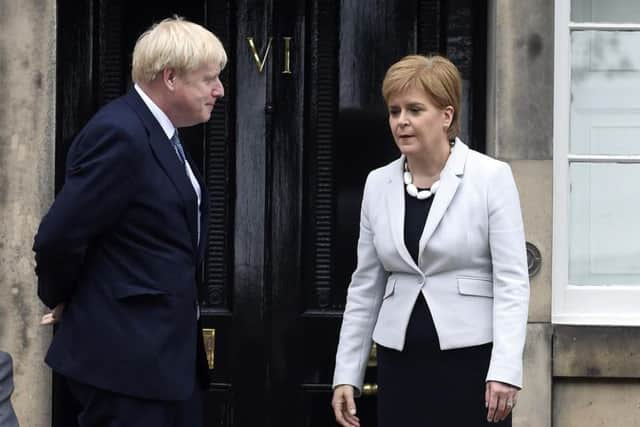Boris Johnson: SNP's focus on Scottish independence has poisoned public life'
The First Minister said last week’s election victory in which her party took 47 of the 59 Scottish seats at Westminster, made the case for another referendum “unarguable”.
Launching a 38-page document entitled Scotland’s Right to Choose, she announced that not only would she ask for a Section 30 Order – the time-limited transfer of powers to hold a referendum next year – but that the Scotland Act should be permanently changed so future Scottish Governments would not have to seek Westminster’s permission for a vote.
Advertisement
Hide AdAdvertisement
Hide Ad

However in the Commons yesterday, Boris Johnson said that division had “poisoned” public life, and ruled out giving permission for another referendum.
He said: “It was Nicola Sturgeon herself who said that the referendum in 2014 was once in a generation, and I feel the Scottish National Party should concentrate more on delivering the domestic priorities of the people of Scotland and rather less on breaking up our United Kingdom.”
Earlier Ms Sturgeon said she expected “to get a flat no” from Westminster initially, but that “even the dogs in the street know there will be a second referendum.
“I’m going to stand my ground. That will not be the end of the matter and Boris Johnson should not be under any illusion that it is,” she said.
“It is for the Prime Minister to defend why he believes that the UK is not a voluntary union of equal nations.
“The Conservatives’ only response to this so far has been the referendum result in 2014, they use that result to justify doing whatever they want to Scotland no matter how much damage they cause to people’s lives. The Tories are in effect saying that democracy in Scotland stopped the day we voted no in 2014, and that cannot and will not hold.”
Her document outlined plans to amend the 1998 Scotland Act to say: “It is recognised that the people of Scotland have the right to determine the form of government best suited to their needs” and that Schedule 5 of the legislation, which deals with reserved issues to Westminster, be changed to remove the right to “reserve a referendum on the independence of
Scotland from the rest of the United Kingdom”.
The document also described the Union as a “voluntary association of nations”, and stressed that as such “it must be open to any of its parts democratically to choose to withdraw from the Union”.
Advertisement
Hide AdAdvertisement
Hide AdSpeaking at Bute House, her official residence in Edinburgh, Ms Sturgeon said: “The alternative is a future that we have rejected being imposed upon us. Scotland made it very clear last week it does not want a Tory government led by Boris Johnson taking us out of the European Union.”
However her demand was dismissed by Michael Gove who reiterated Mr Johnson’s comments that the SNP should concentrate on improving Scotland’s hospitals and schools rather than trying to re-run an independence referendum.
The Chancellor of the Duchy of Lancaster, said: “Politicians across the United Kingdom should be concentrating on the issues that really matter to people: improving the NHS, fighting crime and helping to improve education.”
Ms Sturgeon insisted there is a “democratic mandate” for Scots to be given a choice of staying in the UK with Boris Johnson – or become an independent nation. “It is a fundamental democratic principle that decisions on Scotland’s constitutional future should rest with the people who live here.”
Not every Conservative was as emphatic in denying the idea of a referendum as the Prime Minister.
Sutton Coldfield MP Andrew Mitchell said that there had been “many factors at play” in the Scottish election results, but that it would not be possible for the Prime Minister to resist demands for a referendum forever. “If you are asking me whether or not if the UK government can put off forever the demands of the SNP in government in Edinburgh, my answer is no,” he said.
Asked if Boris Johnson’s current position could stand he said: “I think it will stand for now, and I think it will stand until the end of the Brexit process and the new settlement is clear.
“I think it will be extremely difficult for the British government to resist the strong argument from the government in Edinburgh that they want the people to have the choice again – they can resit it for a bit, but it would not be possible to resist it forever.”
Advertisement
Hide AdAdvertisement
Hide AdSNP Westminster leader Ian Blackford also raised the issue of a referendum in the Commons – and was infuriated that Boris Johnson could be seen studying his mobile as Mr Blackford gave the SNP’s response to the Queen’s Speech.
He said: “Can I say to the Prime Minister, it is not a good look to see him playing with his phone rather than listening to the demands of the Scottish National Party.”
“Well say something more interesting,” the PM replied, before putting his phone back in his pocket.